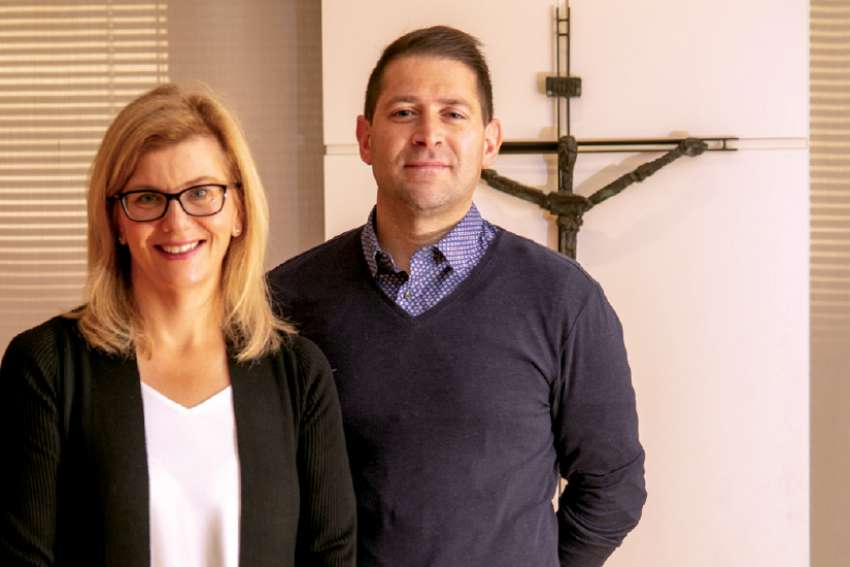But the latest Ontario statistics indicate they may have arrived just as the supply is drying up.
As recently as 2013 the unemployment rate for newly licensed English-language teachers in Ontario ran as high as 45 per cent, according to the Ontario College of Teachers. In 2017 the jobless rate for young teachers was down to 19 per cent overall. Unemployment for first-year math and science teachers was just 11 per cent, compared with 23 per cent for teachers who don’t have those math and science backgrounds.
Lesya Balsevich, the associate superintendent of human resources for the Catholic Independent Schools of Vancouver Archdiocese, believes those numbers leave enough room for the Vancouver schools to capture one or two just-licensed Ontario teachers.
“We don’t just need teachers who are certified,” Balsevich told The Catholic Register while in Toronto for the EdTalent 2018 job fair on Oct. 26. “We need teachers who have passion for their faith. Our schools deserve to have Catholic educators.”
Balsevich’s need is fed by a 2016 Supreme Court of Canada decision striking down a British Columbia law that ran roughshod over collective agreements between the province and teachers. The court decision restored limits on class sizes and minimum ratios that dictated, for instance, that boards had to have one ESL teacher for every 50 ESL students.
In addition to immediate full-time contracts, the CISVA offers a community atmosphere and community support, Balsevich said.
“When you come to work for us you don’t come as a worker. You come as part of a community,” Balsevich said. “We hold onto that sense of being parochial. We are connected to parish communities. We are the neighbourhoods that no longer exist in the world. We create a second-home feel.”
What they’re not offering is the kind of money unionized teachers in Ontario have come to expect. Where Ontario teachers earn anywhere from $78,000 to $96,000 after 10 years of teaching, the CISVA grid tops out at $78,000 without many of the protections and benefits that come with a union.
If teachers in Ontario are having a tough time landing a permanent job, the issue isn’t an oversupply of new teachers. The culprit is a regulation agreed to in collective bargaining that binds school boards to hire those with the most seniority on their supply teacher lists, said Ontario Catholic School Trustees’ Association executive director Nick Milanetti, who used to run human resources for the Dufferin-Peel Catholic board.
“Regulation 274 is the real reason why some people have taken a long time to get jobs,” Milanetti said.
On the other side of the management-worker divide, the Ontario English Catholic Teachers’ Association claims boards are failing to hire when openings do come up.
“The data we have seen show that, in some cases, as many as 40 per cent of vacancies are not being covered,” OECTA president Liz Stuart said in an e-mail
In truth the teacher supply picture in Ontario is all over the map. In rural and Northern Ontario boards have a hard time finding teachers. In GTA boards, the occasional teacher lists are as long as your arm.
“The bigger issue would be that if you are willing to move away from where there are not jobs — Mississauga, Brampton, Toronto, York — and move to Halton, Hamilton, any of those areas, you have a better chance.”
Unemployment among first-year Ontario teachers is highest in Toronto and central Ontario and lowest in eastern Ontario, said the annual Ontario Teachers’ College report “Transition to Teaching,” released in February.
Balsevich believes the prospect of a permanent, regular job in the same school or the same classroom every day can make up for less money.
“You can’t just be a Band-Aid when you walk in,” she said. “That’s the appeal. I can say, ‘You come (to Vancouver), you get your own classroom.’ We get you on a contract right away.’”
Balsevich acknowledges that Vancouver housing prices can be a little frightening, even for someone from Toronto. The $1.60 per litre gas doesn’t help her cause, either. But that’s where the community support comes in, she said. Parishioners in Vancouver are willing to put new teachers up in their homes while they search for a place to settle down.
After years of Ontario teacher shortages driven by early retirement packages offered from 1998 to 2002, and then a glut of teachers graduating from 2005 through 2014, Ontario went to a two-year teacher training program in 2015. Since then the supply of new teachers has finally balanced out against the number of retirements province wide at about 5,000 a year.
Stuart worries about the atmosphere surrounding the teaching profession due to a government that launched a phone line for parents to report teachers who fail to teach the new sex-ed curriculum, and is now proposing math tests for new teachers.


